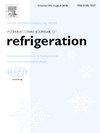Energy consumption prediction of cold storage based on LSTM with parameter optimization
IF 3.5
2区 工程技术
Q1 ENGINEERING, MECHANICAL
International Journal of Refrigeration-revue Internationale Du Froid
Pub Date : 2025-03-25
DOI:10.1016/j.ijrefrig.2025.03.033
引用次数: 0
Abstract
In refined energy management, accurate energy consumption prediction is crucial for fault diagnosis, optimizing system operations based on peak electricity prices, and reducing costs. This study proposes a short-term energy consumption prediction model for cold storage refrigeration systems based on Long Short-Term Memory (LSTM) neural networks. Tailored to the load features of cold storage, the model incorporates compressor unit operating features and air cooler features specific to cold storage factors, rarely addressed in other refrigeration scenarios, as inputs and replaces personnel activity features with time features. This allows the model to predict energy consumption for the next hour while analyzing the impact of each feature on model performance. Results show that compressor unit operating features and air cooler features are essential for prediction accuracy; without these features, the model's R² is only 0.739 and 0.854. Furthermore, compared to models like CNN, BILSTM, and GRU, the LSTM model demonstrates a significant advantage in predictive accuracy, with R² improved by 0.306 to 0.475, confirming its efficiency and reliability in cold storage energy consumption prediction. By introducing an LSTM model that incorporates specific features of cold storage, this study achieves an innovative breakthrough in prediction accuracy for high-energy-consumption cold storage, laying a solid foundation for energy management applications in this field.
基于参数优化的LSTM冷库能耗预测
在精细化能源管理中,准确的能耗预测对于故障诊断、基于峰值电价优化系统运行、降低成本具有重要意义。提出了一种基于长短期记忆(LSTM)神经网络的冷库制冷系统短期能耗预测模型。针对冷库的负载特征,该模型结合了冷库因素特有的压缩机组运行特征和空气冷却器特征,这些特征在其他制冷场景中很少被解决,作为输入,并用时间特征取代了人员活动特征。这允许模型预测下一个小时的能耗,同时分析每个特征对模型性能的影响。结果表明,压缩机机组运行特性和空冷器特性对预测精度至关重要;没有这些特征,模型的R²只有0.739和0.854。此外,与CNN、BILSTM和GRU等模型相比,LSTM模型在预测精度上具有显著优势,R²提高了0.306 ~ 0.475,证实了其在冷库能耗预测中的效率和可靠性。本研究通过引入结合冷库具体特征的LSTM模型,实现了高能耗冷库预测精度的创新突破,为该领域的能源管理应用奠定了坚实的基础。
本文章由计算机程序翻译,如有差异,请以英文原文为准。
求助全文
约1分钟内获得全文
求助全文
来源期刊
CiteScore
7.30
自引率
12.80%
发文量
363
审稿时长
3.7 months
期刊介绍:
The International Journal of Refrigeration is published for the International Institute of Refrigeration (IIR) by Elsevier. It is essential reading for all those wishing to keep abreast of research and industrial news in refrigeration, air conditioning and associated fields. This is particularly important in these times of rapid introduction of alternative refrigerants and the emergence of new technology. The journal has published special issues on alternative refrigerants and novel topics in the field of boiling, condensation, heat pumps, food refrigeration, carbon dioxide, ammonia, hydrocarbons, magnetic refrigeration at room temperature, sorptive cooling, phase change materials and slurries, ejector technology, compressors, and solar cooling.
As well as original research papers the International Journal of Refrigeration also includes review articles, papers presented at IIR conferences, short reports and letters describing preliminary results and experimental details, and letters to the Editor on recent areas of discussion and controversy. Other features include forthcoming events, conference reports and book reviews.
Papers are published in either English or French with the IIR news section in both languages.

 求助内容:
求助内容: 应助结果提醒方式:
应助结果提醒方式:


